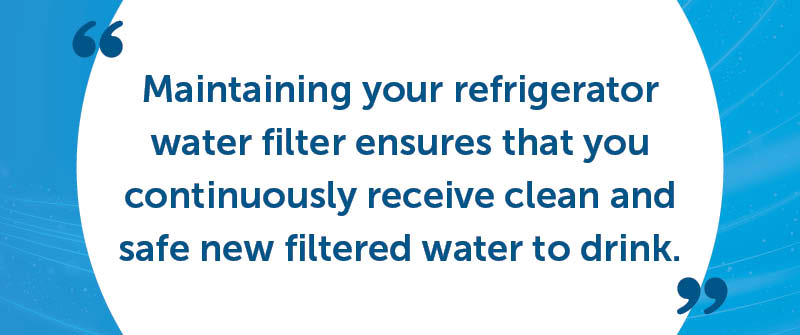How Do I Know If My Refrigerator Water Filter Needs Replacing?
Knowing when to replace your refrigerator water filter is crucial for ensuring clean and safe drinking water. Here are some key signs that indicate your water filter needs replacing:
Signs of a Bad Water Filter
One of the first indicators of a bad water filter is a noticeable change in the taste and odor of your water. If your water starts to taste metallic or has an unpleasant odor, it’s a clear sign that the filter is no longer effectively removing contaminants. In addition to taste and odor changes, you might also notice cloudy or discolored water, which are further indications that the filter’s efficiency is compromised.
Changes in Taste and Odor in Water
Changes in taste and odor are often the most immediate and noticeable signs. As a water filter becomes saturated with contaminants, it loses its ability to filter out impurities effectively. This can result in water that tastes off or has an unusual smell. If you detect these changes, it’s time to check and likely replace your filter.
Water Pressure Drop
Another sign that your refrigerator water filter needs replacement is a drop in water pressure from the dispenser. Clogged or expired refrigerator filters restricts the flow of water, causing it to take longer to fill a glass or container. If you experience slow water flow, it may be due to a filter that needs replacing.
Indicator Light on Refrigerator
Most modern refrigerators are equipped with an indicator light that alerts you when it’s time to change the filter. While the specific mechanism can vary between models, the indicator typically lights up based on the amount of water that has passed through the filter or after a set time period, usually six months. Ignoring this light can lead to deteriorating water quality.
What Happens When Refrigerator Water Filter Goes Bad?
When a refrigerator water filter goes bad, it can have a variety of negative impacts not only on the quality of your drinking water but also on your overall health and the efficiency of your appliance.
Health Implications
One of the most immediate concerns is the potential health risks. An old or clogged filter may fail to remove harmful contaminants such as chlorine, lead, and bacteria, which can pose significant health risks. If these contaminants are not filtered out, they can make their way into your drinking water, potentially leading to various health issues, especially for people with weakened immune systems or those who rely heavily on the water from their refrigerators.
Harmful Bacterial Growth
Another serious issue is bacterial growth. A bad water filter no longer effectively removes impurities, which creates an ideal environment for bacteria, mold, and algae to thrive. Over time, these microorganisms can multiply and make your water unsafe to drink. You might notice a slimy buildup in your water dispenser or an odd taste and odor, which are signs that bacteria may be present.
Impact on Appliance Efficiency
A clogged or expired filter can also affect the efficiency of your refrigerator. When the water filter is not functioning correctly, it can cause the water pressure in the dispenser to drop, making it less convenient to use. Additionally, a filter that has exceeded its lifespan can become clogged with debris, forcing your refrigerator’s water pump to work harder. This increased strain can lead to higher energy consumption and even potentially damage the pump over time.
Being aware of these dangers underscores the importance of regular refrigerator water filter replacement. Not only does this practice ensure the quality and safety of your drinking water, but it also helps maintain the longevity and efficiency of your appliance.
What Happens If You Don’t Change Your Fridge Water Filter?
Contaminants Buildup
Neglecting to change your fridge’s water filter can lead to a significant buildup of contaminants. Over time, filters become saturated with particles, debris, and pollutants, reducing their ability to effectively filter your water. This can result in contaminants such as lead, chlorine, and other harmful substances being present in your drinking water. Aside from the health risks, the presence of these contaminants can also affect the taste and odor of your water, making it less palatable.
Reduced Functionality
Another consequence of not replacing your water filter is the reduced functionality of your refrigerator. When the filter is clogged, it can reduce water flow, which may lead to issues with the ice maker and water dispenser. Over time, this can cause stress and potential damage to the filters and the refrigerator’s internal components, leading to costly repairs. Additionally, blockages may also affect the cooling efficiency of your appliance, which can contribute to increased energy consumption and higher utility bills.
Taste and Odor Issues
One of the most noticeable signs of a neglected water filter is changes in taste and odor. When the filter is old and no longer traps contaminants effectively, you may notice a distinct bad taste or unpleasant smell in your water. This deterioration in water quality is a clear sign that it’s time to replace your filter. Consistently good-tasting and smelling water is essential for ensuring that you stay hydrated and that the water you use for cooking and cleaning is safe.
How Often Should A Refrigerator Water Filter Be Changed?
Maintaining your refrigerator’s water filter is essential for ensuring clean, great-tasting water and ice. However, many homeowners are unsure of the optimal schedule for replacing their filters. Here, we break down the key factors that determine how frequently your refrigerator water filter should be changed.
Manufacturer Recommendations
Most refrigerator manufacturers suggest replacing the water filter every six months. This guideline is based on typical usage and is designed to ensure that your filter effectively removes contaminants and provides you with safe drinking water. It’s advisable to check your refrigerator’s user manual for specific recommendations tailored to your appliance model.
Average Usage Scenarios
The frequency with which you need to change your water filter can vary slightly depending on household usage. For instance, a large family that consumes a significant amount of water and ice may need to replace their filter more frequently – possibly every 4 to 5 months. Conversely, a single-person household or a family that doesn’t use the refrigerator’s water and ice dispensers often might extend filter life to up to 9 months. Nevertheless, sticking to the six-month rule is generally a safe bet.
Six Month Refrigerator Water Filter Replacement Rule
The six-month replacement rule isn’t just a suggestion; it’s a way to ensure your water filter remains effective. Over time, filters can become clogged with contaminants, reducing water flow and compromising filtration efficiency. Even if your water taste has not noticeably changed, it’s wise to follow the six-month rule to maintain optimal performance and avoid potential health hazards.
Remember, following a regular water filter maintenance schedule not only keeps your water clean but also extends the lifespan of your refrigerator. Whether you own an LG, Samsung, or any other brand, keeping up with change frequency is crucial for both your appliance’s performance and your family’s health.
Tips for Maintaining Your Refrigerator Water Filter
Maintaining your refrigerator water filter ensures that you continuously receive clean and safe new filtered water to drink. Here are some practical tips to keep your water filter cartridge in top condition:

Resetting the Indicator Light
Many modern refrigerators come equipped with an indicator light that signals when it’s time to change the filter. After replacing the filter, it is crucial to reset this light to ensure accurate notifications in the future. For example, if you own a Samsung refrigerator and have replaced the water filter, but the light is still on, consult your user manual for reset instructions. Typically, this involves pressing and holding a specific button for a set time period.
Steps to Reset the Indicator Light:
- Locate the ‘reset’ button on your refrigerator panel.
- Press and hold the button for 3 to 5 seconds or until the light turns off.
- Check your refrigerator’s manual for model-specific instructions.
Regular Checks
Conducting regular checks on your fridge’s water filtration system is essential. At least once a month, inspect the filter housing for any signs of leaks or damage. Additionally, pay attention to the water’s taste, color, and pressure, as these can be early signs of filter issues. A simple visual inspection can save you from unnecessary complications down the line.
Manufacturer Guidelines
Following the manufacturer’s guidelines for filter maintenance and replacement is always recommended. Each refrigerator model may have specific requirements, and adhering to these will help maintain the unit’s efficiency and longevity. For instance, the manufacturer might recommend running several liters of water through the new filter before use to remove any loose carbon particles.
Summary of Manufacturer Guidelines:
- Check and replace filters as advised (usually every six months).
- Flush the new filter according to instructions.
- Only use genuine replacement filters approved for your refrigerator model.
Is It Really Necessary To Change Your Refrigerator Water Filter Every 6 Months?
Changing your refrigerator water filter every six months might seem like just another task to add to your to-do list, but it’s more than just a maintenance tip—it plays a crucial role in maintaining the quality of your water and the efficiency of your refrigerator. The NSF (National Sanitation Foundation) encourages replacing the refrigerator water filter according to the manufacturer’s recommendations
Health and Safety Considerations
Your water filter is designed to remove impurities and contaminants from your drinking water. Over time, the filter media gets saturated, reducing its effectiveness. Not replacing your filter every six months means you could be consuming water that’s tainted with various contaminants such as chlorine, lead, and other harmful substances. Regularly changing your filter ensures that you’re always drinking clean, safe water.
Comparison with Other Intervals
Some homeowners consider extending the replacement interval beyond six months. While this might seem like a cost-saving measure, it can lead to bigger issues down the line. Filters losing their efficacy after six months won’t be able to provide the same level of filtration, which can affect both the taste and safety of your water. Furthermore, manufacturers’ recommendations are based on extensive research and testing, ensuring the optimal performance and longevity of your refrigerator.
Benefits of Regular Refrigerator Water Filter Changes
Adhering to the 6-month replacement schedule offers several benefits. It guarantees the highest level of filtration performance, contributes to the longevity of your refrigerator, and ensures your household is drinking the best quality water. Keeping your filter updated also prevents any potential clogging issues that might arise from overused filters, thereby maintaining a consistent water flow and reducing the strain on your appliance.
Keep your water pure and your appliance running smoothly by taking the simple step of replacing your filter every six months. Discover the perfect filter for your needs at Discount Filters, where you’ll find a wide range of options for refrigerator water systems, furnace and AC air filters, and more.

